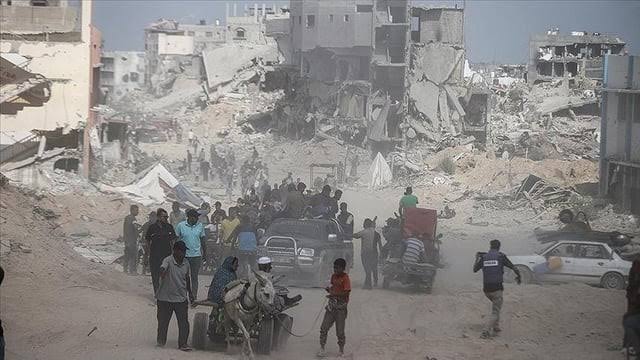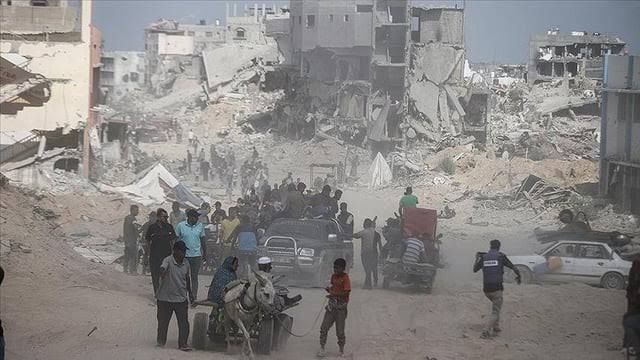International Efforts to End the Gaza War: Prospects and Challenges

Between October 2023 and June 2025, international endeavours to de-escalate Israel’s conflict in Gaza centred on three primary objectives: securing a ceasefire, facilitating Gaza’s reconstruction, and delivering humanitarian aid. The overarching outcome indicates a failure across all these fronts.
Ceasefire initiatives, pursued within and outside the United Nations framework, have consistently faltered. The UN Security Council (UNSC) has seen at least seven resolutions calling for a Gaza ceasefire fail. Two were vetoed by Russia and China, while the United States exercised its veto power five times, underscoring significant divisions among permanent member states. Notably, a March 2024 UNSC resolution, despite Hamas’s acceptance of a hostage-for-prisoner exchange, was rejected by Israel. This rejection prompted Israeli Prime Minister Benjamin Netanyahu to cancel a scheduled visit to the Biden White House, as he publicly condemned the UN as “shameless.”
Outside the UN, the Trump White House pursued a three-phased ceasefire plan, aiming for completion by January 2025. This initiative also collapsed by March, with Israel resuming operations in Gaza after only partial adherence to Phase I. The enduring challenge of the “Hamas question” has further complicated ceasefire negotiations. The international community grapples with the dual reality of Hamas’s established presence in Palestine as a legitimate political actor alongside its documented use of terrorism.
Long-term visions for Gaza’s reconstruction have also remained unrealised.
While the US and Arab stakeholders have put forth various proposals—ranging from President Donald Trump’s suggestion of forcefully displacing Palestinians to create a “riviera” to the Arab League’s endorsement of an Egyptian-led rebuilding initiative for Palestinians—these efforts have been hampered by maximalist positions. Israel and the US continue to advocate for the complete eradication of Hamas, while Arab states have largely sidestepped the long-term reconstruction question, prioritising immediate ceasefire mediation.
The provision of humanitarian aid to Gaza’s 2.1 million civilians, all of whom are reportedly on the brink of starvation, has been woefully insufficient. Israel’s outright rejection of the UN as a legitimate aid channel has severely hampered delivery efforts, particularly since March. In October, Israel banned the United Nations Relief and Works Agency for Palestine (UNRWA). Both the Israel Defence Forces (IDF) and Israeli settlers have actively impeded the movement of most aid trucks into Gaza, citing security concerns related to Hamas. Even when Israel permitted limited aid delivery in May, the UN deemed it woefully inadequate for the scale of the humanitarian crisis. Israel’s preference for a heavily militarised aid approach through the Gaza Humanitarian Foundation (GHF) has been deemed incompatible with international law by the UN Secretary-General.
Shifting International Perspectives on Gaza
International views on the Gaza conflict have undergone notable shifts, particularly between October 2023 and June 2025.
The Trump administration’s broader Middle East policy, while maintaining diplomatic and military support for Israel, has paradoxically proven detrimental to Israel’s stated interests. Washington has engaged with figures opposed by Israel, such as Syria’s Ahmed Al-Sharaa. It brokered a ceasefire with the Houthis, even as attacks on Israel and Israeli-linked shipping persisted.
Furthermore, the US directly negotiated with Hamas in Qatar for the release of an Israeli-American hostage, bypassing Israel entirely. The Trump administration has also continued negotiations with Iran regarding a potential nuclear deal, a policy anathema to Israel. This intricate approach suggests a US strategy of curbing Netanyahu’s regional ambitions while granting him significant leeway concerning Palestinian issues.
The stance of Arab states, including those that normalised relations with Israel through the 2020 Abraham Accords (UAE, Bahrain, and Morocco), has hardened as Israel’s war expands. Israel’s decision to ban a five-country Arab delegation, including Saudi Arabia and the UAE, from visiting the Palestinian Authority in the West Bank in early June further intensified Arab condemnation. Internationally, Arab efforts have increasingly focused on securing greater recognition for a Palestinian state. Saudi Arabia, in conjunction with France, is slated to co-host a UN conference on the two-state solution later this month.
European states have also become increasingly critical of Israel, primarily due to its obstruction of aid delivery. In May, Canada, France, and the United Kingdom issued a rare and unequivocal rebuke of Israel’s actions and committed to “recognising a Palestinian state as a contribution to achieving a two-state solution.” Despite warnings from both Israel and the US, Spain, Norway, and Ireland formally recognised the State of Palestine on May 28. The United Kingdom’s evolving position exemplifies this shift: from abstaining on a ceasefire resolution in October 2023, it now consistently votes in favour, even without explicitly condemning Hamas. Explaining its June 2025 vote, the UK characterised Israel’s new operation as “unjustifiable, disproportionate and counterproductive.”
Israel's Actions
Paradoxically, the growing international pressure (excluding the US) has prompted Israel to expand and intensify its operations in Gaza and its settlement activities in the West Bank, rather than curtail them.
For instance, a week before Trump’s Middle East tour in May, the Israeli cabinet formally approved “Op Gideon’s Chariot,” a plan to “capture” and retain territory in Gaza through an expanded operation. This operation has directly undermined international ceasefire and aid delivery efforts and has been a key catalyst for adverse international reactions towards Israel and increased recognition of Palestinian sovereignty.
While US policy towards the broader Middle East has pushed against some of Israel’s interests, Washington has simultaneously provided unwavering diplomatic and military support for Israel’s actions in Palestine. As Aluff Benn, Editor in Chief of Israel’s Haaretz newspaper, noted, “Trump restrains Netanyahu’s regional ambitions but gives him a free hand with the Palestinians.” This effectively emboldens Netanyahu to pursue Israel’s indefinite occupation of Gaza.
For Netanyahu, the occupation of Gaza is not a novel objective but a long-held ambition. In 2005, he resigned from then-Prime Minister Ariel Sharon’s government to oppose Israel’s withdrawal of illegal settlements from the Strip.
The extent of Israel’s emboldened stance was evident when Netanyahu declared on Thursday (June 5) that Israel was arming criminal gangs in Gaza to combat Hamas. This marked the first official confirmation from the Israeli government of a tactic reminiscent of Netanyahu’s historical preference for tacitly “partnering” with Hamas to undermine the prospect of a unified Palestinian leadership.
The IDF’s recent call for over 400,000 reservists to active duty signals Israel’s preparation for a large-scale occupation of Gaza. For the current Israeli Prime Minister, the overt American support, coupled with the unwillingness of Arab and European states to impose sanctions or substantial punitive measures, provides sufficient impetus to press forward with occupation and further diminish the possibility of a Palestinian state. As has been a recurring theme in Palestine, global support for Palestinian statehood often coincides with Israel’s physical erosion of its feasibility.

 13 hours ago
13 hours ago





[[comment.comment_text]]